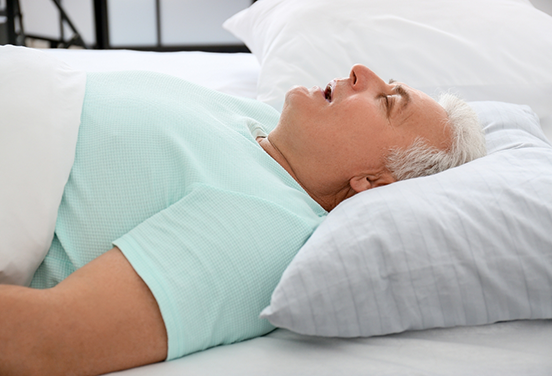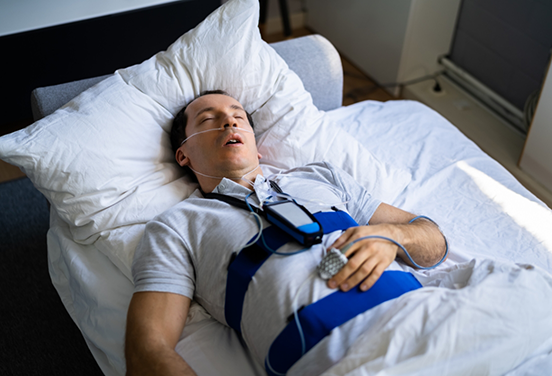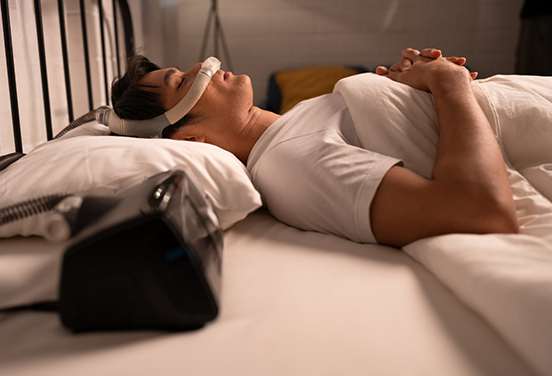Obstructive Sleep Apnea Treatment Fresno
Say Goodbye to Sleepless Nights

Every night, millions of people miss out on countless hours of sleep due to obstructive sleep apnea. However, many patients don’t even realize they’re suffering from sleep apnea until they start to feel its negative impacts! At our office, we can test for and treat this troublesome condition, ensuring that you’re able to get the rest you deserve on a nightly basis while dodging all kinds of health complications. Don’t hesitate to contact our office to learn more or to get started with treatment!
Why Choose The Fresno Center for TMJ & Orofacial Pain for Obstructive Sleep Apnea?
- Skilled Sleep Dentist with Years of Experience
- At-Home Sleep Testing with Accurate Diagnosing
- Personalized Treatment Plans for All Patients
Is Snoring a Sign of Sleep Apnea?

Snoring is generally the most common symptom associated with obstructive sleep apnea; as the soft tissues of the throat partially block the airway, they vibrate as you inhale and exhale. It’s worth noting that not everyone who snores has sleep apnea; however, if frequent or loud snoring is often accompanied by other symptoms, like gasping or choking sounds, morning headaches, or dry mouth, it’s wise to seek treatment before the condition potentially leads to health complications.
Other Sleep Apnea Symptoms

While snoring is among the most common signs of sleep apnea, it’s far from the only one. Some other recognizable symptoms include things like:
- Gasping or choking sounds during sleep
- Feeling tired during the day
- Morning headaches
- Difficulty concentrating
- Dry mouth or sore throat
- Poor attention span or memory issues
- Moodiness or irritability
- High blood pressure
Health Risks of Chronic Snoring

Chronic snoring, especially when loud and accompanied by other symptoms like daytime sleepiness, can be a sign of obstructive sleep apnea, but that’s not the only issue it is linked to. Some other key health risks associated with chronic snoring include:
- Cardiovascular issues, like increased risk of heart attack, stroke, and heightened blood pressure.
- Cognitive impairment, including memory problems or difficulty concentrating or completing simple tasks can result from poor sleep quality.
- Morning headaches and a sore throat are two physical symptoms that can manifest from chronic snoring.
- Studies also link snoring and sleep apnea to an increased risk of developing diabetes.
At-Home Sleep Testing

We’re able to send our patients home with a special sleep apnea testing device that you’ll wear to bed. This device is small, quiet, and non-invasive, and you should hardly notice it while you sleep. Throughout the night, it’ll monitor different bodily systems including your heart, brain, and respiratory system, giving us a comprehensive view of the quality of your sleep. With this data, a proper diagnosis can be determined, and specific treatment can be planned.
How We Treat Obstructive Sleep Apnea

Fortunately, sleep apnea can be treated through a variety of means, and based on your unique circumstances, we might suggest one of a few different solutions. Most people picture CPAP, or continuous positive airway pressure, machines when they think about how sleep apnea is treated. These machines involve a nasal mask that’s worn over the mouth and connected to a hose that feeds oxygen into a patient’s airway during the nighttime.
Oral appliances are the other main means for treating sleep apnea. These come with several unique benefits as well, including convenience and comfort – many patients end up preferring them over CPAP machines due to how comfortable they are and how much easier they are to manage. They’re also highly customizable, ensuring that they don’t just fit well, but also hold the jaw in a position for ensuring proper airflow.
Take Our Sleep Apnea Quiz!

Are you wondering if your sleepless nights are the result of sleep apnea? We encourage you to take our sleep apnea quiz by following the link provided below. This brief assessment won’t take more than a couple of minutes to complete, and it can give you an idea about the condition’s presence and guide you toward seeking treatment.
